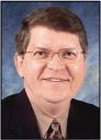UNMC is participating in a clinical trial that is the first one solely intended to study a medication’s effect on pathological gambling.
 “The intent of this study is to determine whether this particular medication can help people who have otherwise uncontrollable cravings to gamble,” said Dennis McNeilly, Psy.D., associate professor in the department of psychiatry , who will lead the study at UNMC. “Ultimately, we hope that the medication will reduce the cravings and urges that these people have, so that they can reasonably assess their behavior.”
“The intent of this study is to determine whether this particular medication can help people who have otherwise uncontrollable cravings to gamble,” said Dennis McNeilly, Psy.D., associate professor in the department of psychiatry , who will lead the study at UNMC. “Ultimately, we hope that the medication will reduce the cravings and urges that these people have, so that they can reasonably assess their behavior.”
UNMC is one of 20 sites nationwide participating in the 15-week, Phase III clinical trial. To be considered for the study, potential participants must meet at least five of the American Psychiatric Association’s 10 criteria for pathological gambling. Potential study participants also must have gambled once in the past month, and three times in the past three months.
“The hallmark of pathological gamblers is that they believe that they’ll win everything back on their next gambling attempt,” Dr. McNeilly said. “They often find themselves lying to others about their gambling, stealing from others to cover financial losses from gambling. They engage in what we call cognitive distortions, that ultimately can lead to an addiction that has a devastating impact on the gamblers and their families.”
Often, Dr. McNeilly said, pathological gamblers think their problem is primarily financial, and not necessarily an addiction. They often misunderstand probability theory, thinking that because they’ve lost several times, their next gambling attempt will “hit it big.”
“Essentially, pathological gamblers ignore the notion that every gambling attempt is a single event,” Dr. McNeilly said. “Your previous results do not impact the odds of you winning the next time. Pathological gamblers convince themselves that they have a “system” or are on a “winning streak,” and so while they may plan to gamble for two hours, they end up staying for five, or until their money runs out. It is not hard for them to lose track of time, while gambling.”
Dr. McNeilly, the executive vice president of the National Council on Problem Gambling, said the medication being tested has shown positive results in preliminary studies. In this study, 500 pathological gamblers at 20 sites nationwide will be studied. Qualified participants will receive physician visits, laboratory tests, psychological tests, study medications, electrocardiograms and medical history reviews at no cost.
To be eligible, potential participants must be age 19 or older, have gambling problems, and be able to attend 11 medical visits at UNMC. They can’t be on any anti-depressants or other medications that affect cognition. Those interested in participating in the study should call 402-354-6868.